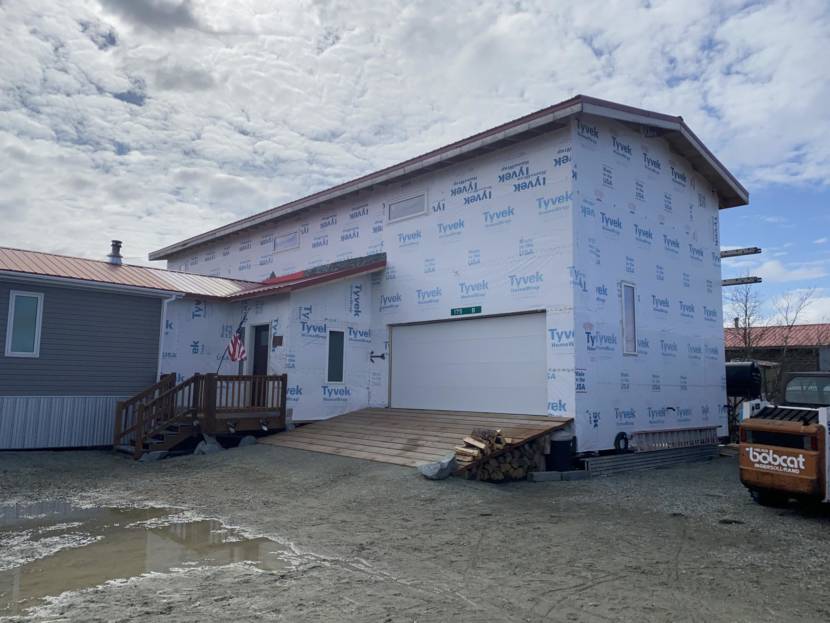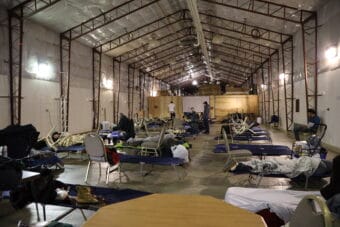
Short-term rentals, also known as bed-and-breakfasts, provide thousands of dollars in tax revenue to the City of Bethel. They also house many of the town’s transient workers. But the city says some of those rentals are operating illegally because they’re in residential districts.
The city recently shut down one short-term rental, saying it was built without permission and in a residential district. But KYUK has identified about 10 others in residential districts — pointing to a broader housing problem in the Yukon-Kuskokwim hub community.
The story begins with a complaint. In June 2019, four neighbors wrote to the city saying that a couple was building an apartment or hotel in a residential area, the Blueberry Subdivision. The neighbors called the building “an atrocity” that violated city codes for the residential subdivision. In planning commission hearings, some neighbors said that the structure was too big and would attract undesired traffic.
While this was happening, Bethel fired its city planner. The new city planner, Ted Meyer, found the building under dispute was permitted for a garage or a shop attached to a house. That wasn’t what he found.
Instead, Meyer found a large two-story building attached to a house. The building had a kitchen on the first floor and four bedrooms — each with its own bathroom — on the second floor. As he was leaving, Meyer said he saw a van full of people entering the property. He concluded that the owners were operating a bed and breakfast that they didn’t have a permit to build.
The building is owned by Dan and Dawn Hackney. Dan Hackney admits that he neglected to include the plans for the bedrooms on his site plan permit.
“I didn’t write two stories on the drawing. My mistake,” Hackney said.
But Hackney said he clearly stated his intentions to build a second story with bedrooms to use as a B&B to the previous city planner, Betsy Jumper. He had owned another home in Blueberry Subdivision that had a two-story rental unit as well, which he said that Jumper referenced in her verbal approval of the new structure.
“And she goes, ‘Oh shoot, Dan, that looks just like what you had across the street.’ I said, ‘Exactly.’ And she says, ‘No problem,’” Hackney said.
So the Hackneys say they assumed they verbal agreement with the city when they spent over $365,000 to build their B&B. Then, Betsy Jumper was fired and Ted Meyer became the new city planner.
According to Meyer, the written record is the only one that matters. He sent a letter to the Hackneys telling them that they had violated multiple city codes. First by building a structure they weren’t permitted for, and then by operating a short-term rental in a residential district. He said that the Hackneys would have to either convert the structure to a code-compliant building or demolish the entire second story.
The Hackneys hired an attorney and appealed the order. In a quasi-judicial hearing in November 2019, the Hackneys’ lawyer and the city’s attorney made their case to the city planning commission.
When the attorney representing the city, Mary Pinkel, questioned former city planner Betsy Jumper in that hearing, she initially testified that she had never given the Hackneys permission to build a two-story addition to their house. But when the Hackneys’ attorney Jared Karr cross-examined her, her story changed.
“You’re testifying that you never told Mr. Hackney he had approval to build a second story in his addition?” Karr asked Jumper.
“No, I don’t believe so,” Jumper said.
“You don’t believe so?” Karr asked.
“I don’t recall,” Jumper said.
“You don’t recall? Could you have told him it was okay to build a second story?” Karr asked.
“I could have,” Jumper said.
“I’m gonna object on relevancy. The issue is whether she gave written consent,” Pinkel said. The planning commission agreed with the city’s attorney, cutting off Karr’s line of questioning, and the alleged verbal agreement was not included as evidence in the case.
The Hackneys appealed again, sending the case to the city’s Board of Adjustment, which is formed of city council members. Council members agreed with the planning commission, and once again the Hackneys’ appeal was denied.
Since then, 18 residents of Bethel have written letters to the planning commission urging it to allow the Hackneys to reopen their B&B. Cynthia Randolph, who runs The Shindig Inn, a B&B also located in Blueberry Subdivision, wrote to the city saying that it was unfairly targeting the Hackneys.
“They should take it away from everybody, right? Shut them all down if that’s what they’re gonna do, not just single this one out,” Randolph said.
According to the city’s land use map, residential districts in Bethel include the subdivisions Blueberry, Larson, Uivik, much of Hoffman, Tundra Ridge, Bethel Heights, City Sub, and Schwalbe.
Some residents say that shutting down the short-term rentals in residential districts would be a bad idea. Devon Jeppesen is a nurse at the Yukon-Kuskokwim Health Corporation who helps find temporary housing for new and transient employees in Bethel. YKHC has its own housing units for this purpose, but Jeppesen said they sometimes fill up, so the city could start losing essential services if it starts shutting down B&B’s.
“If we have nowhere to put people, then they’re not going to come up and work for us. And then we can’t provide patient care,” Jeppesen said.
The number of health care workers who need temporary housing in Bethel has grown in recent years. Scott Cox, another YKHC employee, opened his own short-term rental, The Igloo, in 2018, around when the Yukon-Kuskokwim Health Corporation was finishing its expansion of the hospital in Bethel. Cox said that with the expansion, YKHC was trying to hire more nurses, medical providers, and other staff. Cox opened his B&B to try to remedy that housing shortage for workers.
YKHC spokesperson Mary Horgan confirmed that the health corporation uses B&B’s at times. She added that usage has likely increased in the past decade with the hospital’s growth.
Several short-term rental owners that KYUK talked to said they primarily house employees from YKHC, the State of Alaska, construction companies, the City of Bethel, TSA and sport hunters.
Owning short-term rentals is also an avenue to home ownership in Bethel, where housing costs are high. Carrie Lambert is a teacher and owner of Cranberry Cottage, a B&B located one street over from the Hackneys’ property. She said she was only able to purchase her home in Blueberry Subdivision because the bank gave her a larger loan due to it being a rental property.
Some B&B owners in residential districts want to know why, if their businesses are illegal, the city is issuing them business licenses and accepting their taxes. The Hackneys showed KYUK their business license and taxes they paid to the city when they were operating their B&B. Lambert and Randolph, who operate B&B’s in the same subdivision as the Hackneys did, also said they had business licenses and paid taxes to the city. The city administration did not respond to KYUK’s emails about accepting taxes from short-term rentals that it says are operating illegally.
The dispute with the Hackneys is driving the city to reconsider its laws for short-term rentals. Planning Commission Chair Kathy Hanson said that the city is working on drafting an ordinance that would make short-term rentals in residential districts legal to operate as long as they obtain the city’s written permission. Hanson said that the ordinance would limit the size and number of short-term rentals in a subdivision, although those numbers have not yet been finalized. It’s not clear whether the ordinance would allow the Hackneys’ four-room B&B. Once a final version of the ordinance is drafted, it would be introduced to city council for a vote.
In the meantime, the Hackneys appealed their case again, sending it to the Superior Court for the State of Alaska. In February 2021, a state superior court judge ruled that former city planner Betsy Jumper’s admission that she quote “could have” granted verbal permission to the Hackneys to build a second story was substantial evidence that should have been considered in the city’s earlier hearing and that the Hackneys’ attorney should not have been cut off from questioning Jumper further.
The state court is sending the Hackneys’ case back to the city for another hearing to consider additional witness testimony. That hearing has not yet been scheduled.


